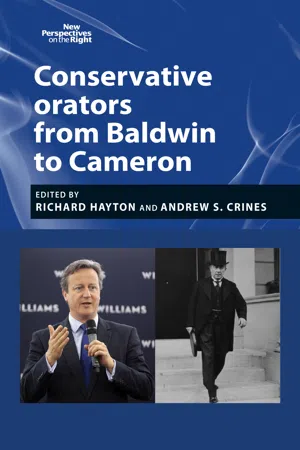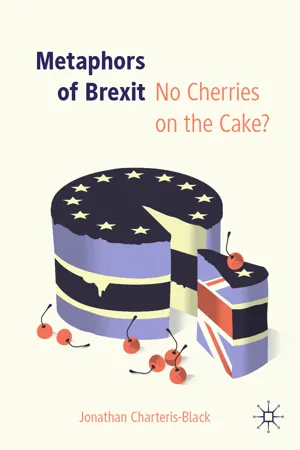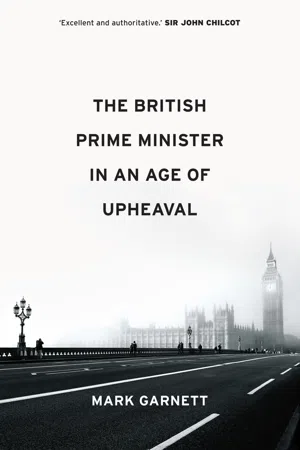Politics & International Relations
Boris Johnson
Boris Johnson is a British politician who has served as the Prime Minister of the United Kingdom since 2019. He is a prominent figure in the Conservative Party and has been known for his charismatic and controversial leadership style. Johnson played a significant role in the Brexit campaign and has been a key figure in shaping the UK's political landscape.
Written by Perlego with AI-assistance
Related key terms
1 of 5
3 Key excerpts on "Boris Johnson"
- eBook - ePub
Conservative orators
From Baldwin to Cameron
- Hayton Richard, Andrew S. Crines, Hayton Richard, Andrew S. Crines(Authors)
- 2015(Publication Date)
- Manchester University Press(Publisher)
2012 ). It is these traits which have led him to achieve phenomenal personal success. Between 2008 and 2010 he was the most senior Conservative politician in office having triumphed in the London mayoral election, and he has subsequently been re-elected despite critiques of his tenure. His platform as London Mayor has allowed him to become a forceful advocator of conservative principles, and whilst other Conservative politicians have subsequently gained power in the Coalition government his status has not diminished.Accordingly Boris Johnson is a complex and apparently contradictory politician. He has close connections to the elite of the Conservative Party, but has cultivated an image as an outsider; he advances controversial views, yet is seen as a champion of common sense and normality; and he attracts scandal, yet has managed to be elected, twice, as London Mayor. For any other politician, maintaining the balance of these different personas would be an impossibility, yet Johnson does so with apparent ease. In this chapter it is argued that his success can be attributed to his skills as an orator and his understanding of persuasion and performance. To advance this argument Johnson’s oratory in front of the party conference and public is examined to demonstrate how a blend of humour, logic and emotion (pathos, logos and ethos) as well as physical theatre is used to create a unique personal appeal and broad support.However, in casting light on the oratorical secrets of Johnson’s success this chapter also sounds a note of caution for those proclaiming his worth as a future Conservative Party leader. Although Johnson’s political approach is seen to offer an attractive alternative in the wake of Cameron’s (now failed) modernisation project, the combination of plain speaking, humour and controversy is not seen to succeed in every context. By exploring the different facets of his oratory as Mayor and his contributions to Parliament the limits of his appeal are highlighted. On this basis it is argued that whilst Boris Johnson has great strengths as a distinctive outsider figure within the Conservative Party, his appeal has profound limitations within more formal, institutionalised and collegiate contexts. From this perspective Johnson’s credentials should be viewed with caution as the party contemplates its future direction and leadership. - eBook - ePub
Metaphors of Brexit
No Cherries on the Cake?
- Jonathan Charteris-Black(Author)
- 2019(Publication Date)
- Palgrave Macmillan(Publisher)
© The Author(s) 2019 J. Charteris-Black Metaphors of Brexit https://doi.org/10.1007/978-3-030-28768-9_6Begin Abstract6. The Metaphors of Boris Johnson
End AbstractJonathan Charteris-Black1(1) Faculty of Arts, Creative Industries and Education, University of the West of England, Bristol, UKIntroduction
Alexander Boris de Pfeffel Johnson is among the most controversial of contemporary politicians. As a former mayor for London, Minister, MP, minor television celebrity and successful journalist he has a wide following and a significant influence on public opinion. He has a reputation for philandering and infidility in marriage, rather than for a coherent set of political beliefs. His appeal arises from a style based on surreal humour , eccentric appearance and considerable linguistic skill. He arouses interest by challenging established attitudes and ridiculing opponents. He can be readily named: we all have an image of the disheveled, blond, larger-than-life schoolboy blasting at an opponent or getting stuck on a zip wire. As a carefully manicured brand, ‘Boris - eBook - ePub
- Mark Garnett(Author)
- 2021(Publication Date)
- Polity(Publisher)
The unpleasant and protracted downfall of Theresa May certainly did not act as a deterrent to would-be successors. The fragmentation of the Parliamentary Conservative Party, in which factions like the all-conquering European ‘Research’ Group (ERG) were themselves beginning to splinter, coupled with the various mishaps suffered by leading contenders in 2016, encouraged obscure figures to hope that they might win against astronomical odds, like Jeremy Corbyn and Foinavon. The rational calculations which normally govern such affairs gave way to irrational optimism; although the contenders had their own solutions for ‘Brexit’, it is unlikely that many of them had given much thought to the crushing demands of the job for which they were vying. At one time it even looked possible that the Conservatives might choose the most interesting and able candidate, Rory Stewart, but his pragmatic stance on Brexit was too great a handicap. Within a few months of the leadership election Stewart had resigned from Parliament and the party.It is a cliché of sports psychology that the winning side will be the one which wants it most, and for once this turned out to be true. In the world of politics, Boris Johnson’s brief first term as Prime Minister (July–December 2019) could almost be compared to the real-life adventures of the young Winston Churchill. It was a story of audacious gambles and miraculous escapology, in which the hero was the beneficiary of good luck as well as his innate cunning. When Theresa May finally stood down, however, Johnson had known that he would only be given the chance to lead his party if his parliamentary colleagues had run out of orthodox options. Even Conservative MPs who doubted that he would stand up to scrutiny in a general election campaign had to accept the fact that ordinary party members found him irresistible. If it turned out that non-committed voters were not equally besotted – and from the outset Johnson’s negative approval ratings suggested that this was the case – he enjoyed the inestimable advantage of a main opponent (Corbyn) who was still more unpopular. Even if his adventure ended badly, Johnson’s party (as usual) would manage to wriggle free from the wreckage. Such calculations ensured that in each of the five ballots held among MPs ‘Boris’ was placed first, and by the fourth round he had secured the support of just over half his parliamentary colleagues.Thus Johnson became the seventh person to hold the office of Prime Minister in the period under review. His elevation came a little later than his preferred timetable, but in many respects he could be counted lucky to have lost the 2016 leadership election. His 2019 victory can be seen as the culmination of a process which began with Thatcher’s election forty years previously. Long before the time of writing (November 2020) there were plenty of reasons for thinking that Johnson is a culmination too far, and that his departure from office, whenever that happens, will promote a reassessment of the prime ministerial role. However, in this book we are dealing with the relatively recent past rather than the future.
Index pages curate the most relevant extracts from our library of academic textbooks. They’ve been created using an in-house natural language model (NLM), each adding context and meaning to key research topics.


